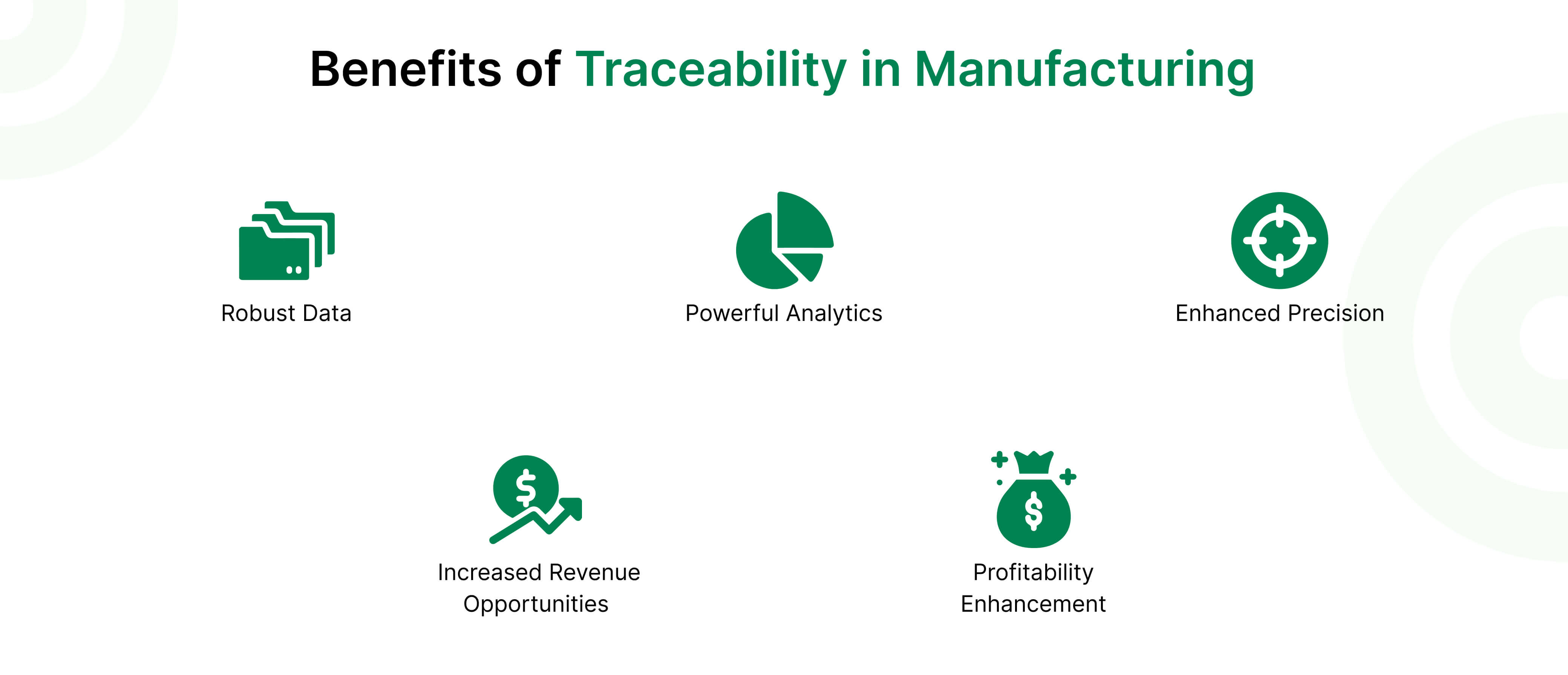Traceability is the ability to identify the origin of items in the manufacturing process. Nowadays, there is a growing need to understand the source of parts and products. This is particularly important in sectors with strict regulations and where product quality is crucial. As safety awareness increases and product quality improves, traceability has become increasingly significant. Therefore, it is essential for manufacturers to prioritize traceability in order to meet industry standards and deliver high-quality products.
This article delves into the significance of traceability in manufacturing industry. Traceability enables manufacturers to track every detail of the production process, from raw material procurement to disposal. It provides numerous benefits, including improving quality and reducing costs. This article offers an in-depth understanding of traceability and its importance for businesses seeking success in the manufacturing industry.
What is Traceability in Manufacturing?
In the manufacturing industry, traceability software involves tracking materials, parts, and products throughout the production process and supply chain. From manual tracking to barcode technology advancements, manufacturers can now easily track items associated with barcodes, such as raw materials, components, subcomponents, and finished products. This evolution in traceability has revolutionized manufacturing operations and improved efficiency in tracking and managing inventory.
Today's traceability system for manufacturing utilizes advanced barcode, RFID, and data analytics technologies to provide real-time production traceability. These systems enable companies to ensure quality, enhance efficiency, and maintain compliance by offering insights into production processes, from the entry of raw materials and parts into operations to the departure of finished products from the facility.
How does it works?
Traceability software in manufacturing ensures the ability to track and trace products throughout the production process. It utilizes unique identifiers like barcodes or RFID tags to monitor raw materials, components, and finished goods. This software captures and stores data at each production stage, facilitating quick retrieval of information in case of recalls or quality issues. By providing a comprehensive digital trail, manufacturers can enhance quality control, comply with regulations, and optimize supply chain efficiency, ultimately improving overall product safety and customer satisfaction.
Why is Traceability software important in Manufacturing?
Now that we've defined traceable manufacturing, let's look at its importance in the manufacturing industry.
Traceability enables manufacturers to readily detect and locate when and where an issue occurred, facilitating root-cause analysis. It also discusses the specifics of the issue. As a result, it greatly contributes to improved quality and efficiency by providing real-time visibility.
Resolve Inefficiencies
Addressing inefficiencies is a key benefit of traceability in manufacturing throughout a product's lifecycle and supply chain. By identifying and resolving issues, traceability optimizes manufacturing processes, minimizing waste. Early detection prevents potential factors contributing to inefficiency. Implementing traceability systems enhances visibility, enabling production process optimization and reducing resource wastage for improved efficiency.
Preventing Product Recall
Product recalls can be greatly disruptive to a business's operations. Industries are widely implementing product traceability in manufacturing to manage avoidable product recalls. It not only reduces the chance of product recalls, but it also minimizes damages and improves on issues that manufacturers frequently confront.
When the origin of components can be traced, there is a better probability of finding compromised raw materials before they are used to make your product and distributed. It is preferable to avoid making a mistake than to try to correct one after the product has been shipped.
Enables History Management
Monitoring manufacturing data and compliance with evolving regulations can be challenging. Therefore, an indispensable solution in the present era is a robust history management system. The escalating forces of globalization amplify the necessity for a history management system detailing manufacturing processes and plant operations.
Ensures Compliance and Quality Control
Facilitating compliance with regulatory standards and tracking the production process are crucial for businesses. It not only assures adherence to regulatory requirements but also enhances quality control. Traceability, ensuring quality at every stage, serves as a robust mechanism for high-level quality assurance in manufacturing processes.
Customer Satisfaction
Traceability in manufacturing process plays a pivotal role in customer relationship management and complaint resolution. When customers detect errors in a product, traceability facilitates pinpointing the source of the issue. Robust traceability systems not only enhance market positioning but also empower organizations to implement incremental product improvements. This strategic approach enables the development of higher-quality products that align with and meet evolving customer requirements.
Benefits of Traceability in Manufacturing

Robust Data
A solid foundation for production traceability lies in capturing substantial data. This isn't just any data; it's meaningful information that not only offers valuable insights but also generates valuable knowledge. Any item affixed with a barcode label or RFID tag becomes an opportunity to convey and gather information, encompassing details such as price, origin, certifications, tolerances, and material handling. These identifiers also facilitate tracking objects at various touchpoints in the manufacturing process, aiding in location determination, historical tracking, and the assessment of workflow changes.
Powerful Analytics
The benefits of traceability in manufacturing & tracking systems empower companies to swiftly and accurately make data-driven decisions through robust analytics software. Analytics not only facilitate troubleshooting of manufacturing issues but also allow testing of preventive measures without disrupting production. Furthermore, maintaining a precise genealogy database enables the comprehension of historical patterns, serving as a springboard for continuous process improvement initiatives.
Enhanced Precision
Automated internal traceability systems offer real-time data and analytics, elevating accuracy in various aspects of production and business forecasting such as inventory, equipment, labor, process changes, and profitability. Origin and genealogical precision is particularly crucial to mitigate liability risks. In contrast, manual data gathering lacks timeliness and accuracy, lending collaborative efforts facilitated by easily shareable data and unified reporting.
Increased Revenue Opportunities
Traceability in manufacturing serves as a compelling selling point, showcasing optimal processes, production agility & flexibility. It becomes a competitive differentiator, with traceability software providing analytics for scalability testing, process changes, and equipment integration without disrupting operations, especially beneficial for companies in growth mode.
Profitability Enhancement
Modern manufacturing tracking systems form the core of operational efficiency, offering diverse levers for profit improvement. From identifying production efficiency opportunities to implementing robust quality control measures, traceability contributes to overall profitability. Additionally, it limits financial risks associated with regulatory noncompliance, theft, and recalls, reinforcing its role as a strategic asset.
Traceable Manufacturing Types
In manufacturing, two distinct forms of traceability exist, commonly known as product tracking and tracing. To delve deeper into these categories, let's explore each type in detail:
1. Product Tracking: Tracking a product's journey throughout the production cycle ensures meticulous monitoring, aiming to prevent logistical errors during production. Continuous surveillance of these products is maintained for logistical precision.
2. Product Tracing: Tracing a product's origin within a batch is facilitated by product tracing. This involves referencing supply chain records to identify and isolate faulty batches. Product traceability in manufacturing is instrumental in resource conservation, mitigating the need for widespread product recalls, optimizing efficiency for companies.
Improve Traceability software in Manufacturing with Transgenie
Transgenie offers a range of modern tools and software that can automate the production of traceability, tracking and material traceability in manufacturing. These tools enable manufacturers to monitor parts and products along the production line automatically while recording all relevant data. With Transgenie, manufacturers can create custom tools and software that use barcodes, RFID tags, or QR codes to trace products as they move through their facility.
By using Transgenie's tools and software, manufacturers can quickly identify and correct issues, saving time and money in the long run. The technology offers an efficient way to improve traceability in the manufacturing process, ensuring that products are authentic, high-quality, and meet regulatory requirements.
If you are interested in learning more about how Transgenie can help improve traceability in your manufacturing process, contact us today.
Conclusion
You can retain tight control over every stage of your production process with traceability. Understanding a product's whole history allows you to quickly detect and rectify problems, saving you time and money in the long term. Implementing traceability can help you increase efficiency and productivity, which can help you boost your bottom line. Also, make certain that only high-quality products reach your buyers.
Are you prepared to include traceability in your manufacturing process? We can assist! Contact Transgenie today if you want to improve traceability in manufacturing process.






Yokesh Sankar